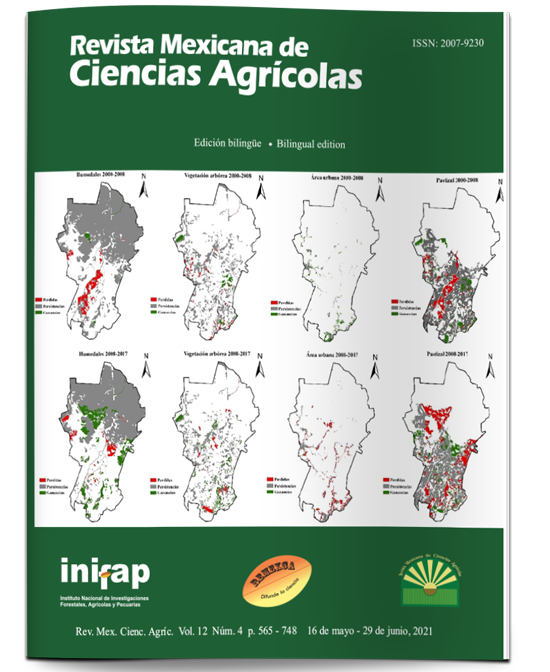General and specific combinatorial aptitude of low-inbreeding yellow maize varietal hybrids
DOI:
https://doi.org/10.29312/remexca.v12i4.2786Keywords:
Zea mays L., general combinatorial aptitude, specific combinatorial aptitude, varietal hybridsAbstract
The production of yellow maize (Zea mays L.) in Mexico is in deficit and its demand increases every year. In this paper, the effects of general and specific combinatorial aptitude, maternal and reciprocal effects for yield variables and their components of five varieties of yellow maize with low level of inbreeding and their diallel crosses were estimated. All genotypes were evaluated in a randomized complete block experimental design with three repetitions per environment, during the spring-summer cycle from 2017 to 2019. Genetic analysis was performed using Griffing’s method I. The results indicated that the variety IA324 due to its high yield would have a high contribution in the expression of the yield of its progeny and could be included in a maize genetic improvement program. The direct and reciprocal crosses with higher specific combinatorial aptitude (ACE) for yield were HVAA-10 x IA324 and IA324 x HVAA-9, respectively. It was found that the use of progenitors of contrasting general combinatorial aptitude (ACG) allowed the favorable expression of their progeny. The yellow grain varieties of this work with high ACG effects can be used to develop synthetic varieties or continue advancing more selection cycles, considering that the lines with high ACG detected in early tests retain their additive values in advanced generations, while crosses with high ACE can be used for hybridization.
Downloads
Published
How to Cite
Issue
Section
License
The authors who publish in Revista Mexicana de Ciencias Agrícolas accept the following conditions:
In accordance with copyright laws, Revista Mexicana de Ciencias Agrícolas recognizes and respects the authors’ moral right and ownership of property rights which will be transferred to the journal for dissemination in open access. Invariably, all the authors have to sign a letter of transfer of property rights and of originality of the article to Instituto Nacional de Investigaciones Forestales, Agrícolas y Pecuarias (INIFAP) [National Institute of Forestry, Agricultural and Livestock Research]. The author(s) must pay a fee for the reception of articles before proceeding to editorial review.
All the texts published by Revista Mexicana de Ciencias Agrícolas —with no exception— are distributed under a Creative Commons License Attribution-NonCommercial 4.0 International (CC BY-NC 4.0), which allows third parties to use the publication as long as the work’s authorship and its first publication in this journal are mentioned.
The author(s) can enter into independent and additional contractual agreements for the nonexclusive distribution of the version of the article published in Revista Mexicana de Ciencias Agrícolas (for example include it into an institutional repository or publish it in a book) as long as it is clearly and explicitly indicated that the work was published for the first time in Revista Mexicana de Ciencias Agrícolas.
For all the above, the authors shall send the Letter-transfer of Property Rights for the first publication duly filled in and signed by the author(s). This form must be sent as a PDF file to: revista_atm@yahoo.com.mx; cienciasagricola@inifap.gob.mx; remexca2017@gmail.
This work is licensed under a Creative Commons Attribution-Noncommercial 4.0 International license.



